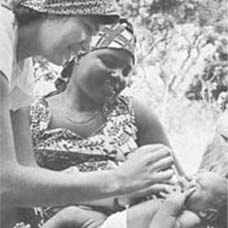
Cameroon RPCV Margaret Krome says Viet Vet Still Struggles with Aftermath of War
Viet Vet Still Struggles with Aftermath of War
by Margaret Krome
I had lunch last week with a new friend. When Jack, now farming in West Virginia, began telling me about his Vietnam experiences, I understood his visceral opposition to war with Iraq.
Jack was a Marine, trained at Camp Lejeune, N.C. He was well-trained as a killer, trained to react reflexively to life-threatening challenges and to ask no questions. In the summer of 1965, he was sent to Vietnam as a machine gunner, landing just after a major U.S. offensive called Operation Starlight.
Culture shock hit immediately when he saw hands and feet dangling from trees. The first two times he killed someone he threw up. Quickly, he saw his friends die. But he was well-trained and became a good killer, often in squads of several soldiers on overnight ambushes and search-and-destroy missions against the Viet Cong and North Vietnamese.
Six months after he arrived, severe intestinal parasites sent Jack out of Vietnam. The day after he was flown out, 11 of his fellow Marines were killed on the front line. He still hasn't gotten over their deaths.
He came home, married, but couldn't adjust. "I was a good killer, trained for battle. I couldn't use it here, and I couldn't fit in." For that reason and perhaps survivor guilt, he re-enlisted and was sent back to Vietnam. He described the intensity of being close to death, of having his nerves constantly focused on staying alive, on the compelling camaraderie with buddies whose lives he protected and who protected his. He described the heartbreak of carrying out dead soldiers.
When he returned home a year later, his wife wanted a child, whereas he wanted to buy a motorcycle and travel. They divorced amicably enough, in a pattern that he repeated again and again and describes as classic for a veteran with undiagnosed post traumatic stress disorder.
It was hard, he said, to find jobs and relationships that could approach the razor-sharp emotional edge of war. He had hated the war, yet it left him with an emotional need for its intensity. He wasn't comfortable without a gun for two years after returning and still can't sleep, waking frequently to patrol the perimeter. Gregarious, he has married four more times and taken many jobs, from installing swimming pools to selling health insurance to growing bean sprouts and Christmas trees, always moving on when the excitement or challenge of a job ended or when marriage normalized. In the process, he has fathered six children.
Jack doesn't avoid describing the havoc he has wrought in the lives of people he loves. What has saved him, he says, is finally being diagnosed with post traumatic stress disorder and treated appropriately by a doctor who invested effort in helping him.
The National Institute of Mental Health estimates that 1 million Vietnam veterans developed post traumatic stress disorder. The National Center for PTSD estimates that 30 percent of men and women who have spent time in Korea, the Persian Gulf and other war zones will develop the disorder.
Now classified as 100 percent disabled by post traumatic stress disorder, Jack devotes his life to helping other veterans. West Virginia's countless hills and hollows are a refuge for a large number of veterans who retreat there, often paranoid and too afraid to get help from a government agency. Jack helps because "when you bottom out with PTSD, it's really bottom, bottom."
Jack adamantly opposes war with Iraq. "It's the war machine again," he says, "created only so big boys can make big money." And no matter how big the death toll in Iraq, he knows how hopelessly and senselessly millions more lives will be torn up when soldiers come back home.
Margaret Krome, who lives in Madison, is a regular columnist for The Capital Times.
Copyright © 2002, The Capital Times








